Mental Health Assessment & Plan of Care: A Case Study of Munny Kaew
VerifiedAdded on 2022/10/11
|9
|2724
|476
Case Study
AI Summary
This assignment provides a detailed analysis of Munny Kaew's mental health condition, focusing on his presentation at a community center due to concerns raised by his wife, Ary. The assessment identifies key issues such as significant weight loss, reduced social interaction, and symptoms indicative of severe depression. The analysis employs the Mental State Examination (MSE), Diagnostic and Statistical Manual of Mental Disorders V (DSM V), and explores contributing factors using the stress-vulnerability model and trauma-informed care. The assignment also proposes a recovery-oriented mental health practice, emphasizing respect, empowerment, and hope to improve Munny's condition. Furthermore, it outlines a plan of care that includes weight management and interventions to enhance social interaction, while also addressing legal, professional, and ethical considerations for the nurse involved. The overall goal is to provide a comprehensive approach to Munny's mental health recovery, integrating various models and practical interventions.
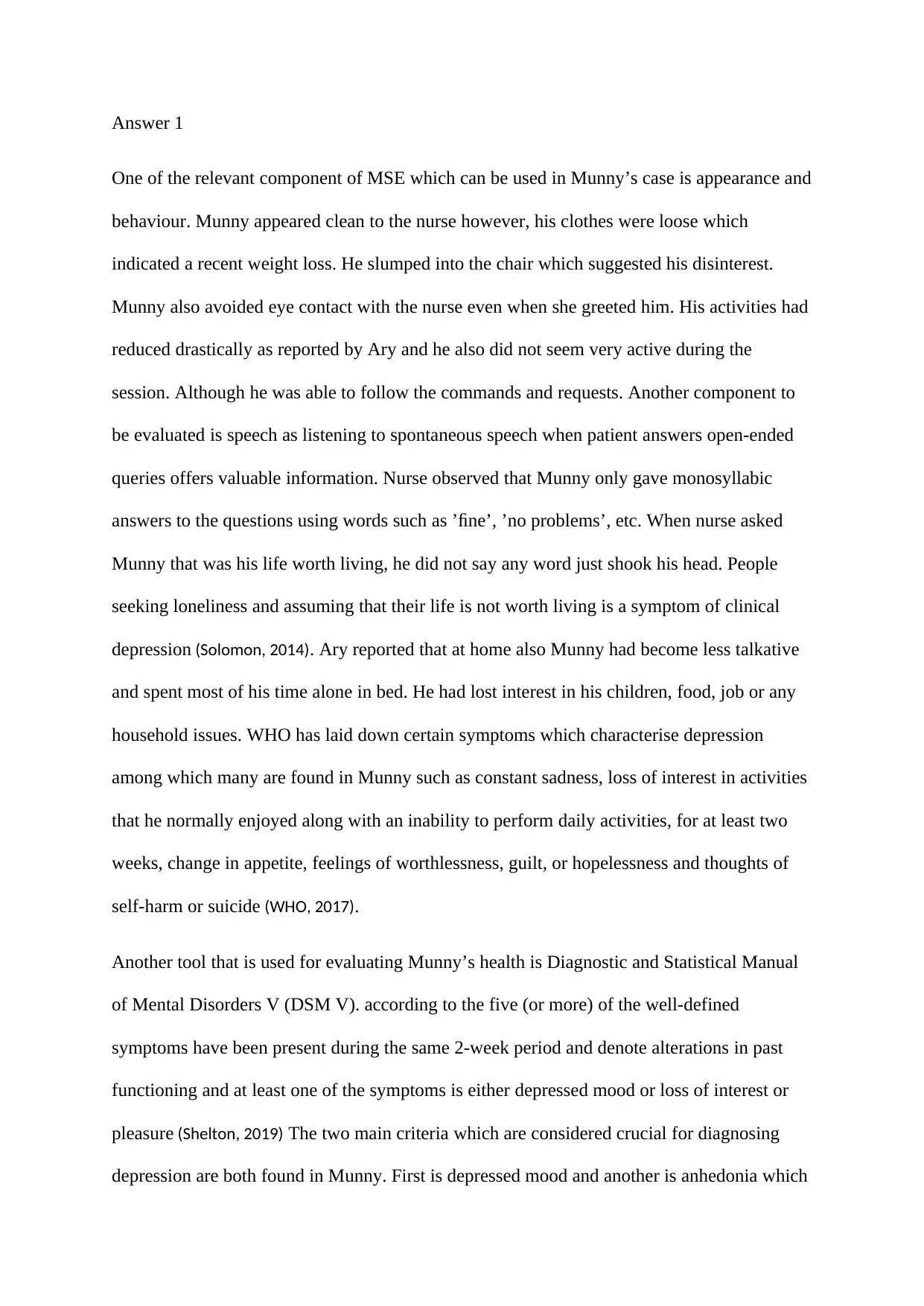
Answer 1
One of the relevant component of MSE which can be used in Munny’s case is appearance and
behaviour. Munny appeared clean to the nurse however, his clothes were loose which
indicated a recent weight loss. He slumped into the chair which suggested his disinterest.
Munny also avoided eye contact with the nurse even when she greeted him. His activities had
reduced drastically as reported by Ary and he also did not seem very active during the
session. Although he was able to follow the commands and requests. Another component to
be evaluated is speech as listening to spontaneous speech when patient answers open-ended
queries offers valuable information. Nurse observed that Munny only gave monosyllabic
answers to the questions using words such as ’fine’, ’no problems’, etc. When nurse asked
Munny that was his life worth living, he did not say any word just shook his head. People
seeking loneliness and assuming that their life is not worth living is a symptom of clinical
depression (Solomon, 2014). Ary reported that at home also Munny had become less talkative
and spent most of his time alone in bed. He had lost interest in his children, food, job or any
household issues. WHO has laid down certain symptoms which characterise depression
among which many are found in Munny such as constant sadness, loss of interest in activities
that he normally enjoyed along with an inability to perform daily activities, for at least two
weeks, change in appetite, feelings of worthlessness, guilt, or hopelessness and thoughts of
self-harm or suicide (WHO, 2017).
Another tool that is used for evaluating Munny’s health is Diagnostic and Statistical Manual
of Mental Disorders V (DSM V). according to the five (or more) of the well-defined
symptoms have been present during the same 2-week period and denote alterations in past
functioning and at least one of the symptoms is either depressed mood or loss of interest or
pleasure (Shelton, 2019) The two main criteria which are considered crucial for diagnosing
depression are both found in Munny. First is depressed mood and another is anhedonia which
One of the relevant component of MSE which can be used in Munny’s case is appearance and
behaviour. Munny appeared clean to the nurse however, his clothes were loose which
indicated a recent weight loss. He slumped into the chair which suggested his disinterest.
Munny also avoided eye contact with the nurse even when she greeted him. His activities had
reduced drastically as reported by Ary and he also did not seem very active during the
session. Although he was able to follow the commands and requests. Another component to
be evaluated is speech as listening to spontaneous speech when patient answers open-ended
queries offers valuable information. Nurse observed that Munny only gave monosyllabic
answers to the questions using words such as ’fine’, ’no problems’, etc. When nurse asked
Munny that was his life worth living, he did not say any word just shook his head. People
seeking loneliness and assuming that their life is not worth living is a symptom of clinical
depression (Solomon, 2014). Ary reported that at home also Munny had become less talkative
and spent most of his time alone in bed. He had lost interest in his children, food, job or any
household issues. WHO has laid down certain symptoms which characterise depression
among which many are found in Munny such as constant sadness, loss of interest in activities
that he normally enjoyed along with an inability to perform daily activities, for at least two
weeks, change in appetite, feelings of worthlessness, guilt, or hopelessness and thoughts of
self-harm or suicide (WHO, 2017).
Another tool that is used for evaluating Munny’s health is Diagnostic and Statistical Manual
of Mental Disorders V (DSM V). according to the five (or more) of the well-defined
symptoms have been present during the same 2-week period and denote alterations in past
functioning and at least one of the symptoms is either depressed mood or loss of interest or
pleasure (Shelton, 2019) The two main criteria which are considered crucial for diagnosing
depression are both found in Munny. First is depressed mood and another is anhedonia which
Paraphrase This Document
Need a fresh take? Get an instant paraphrase of this document with our AI Paraphraser
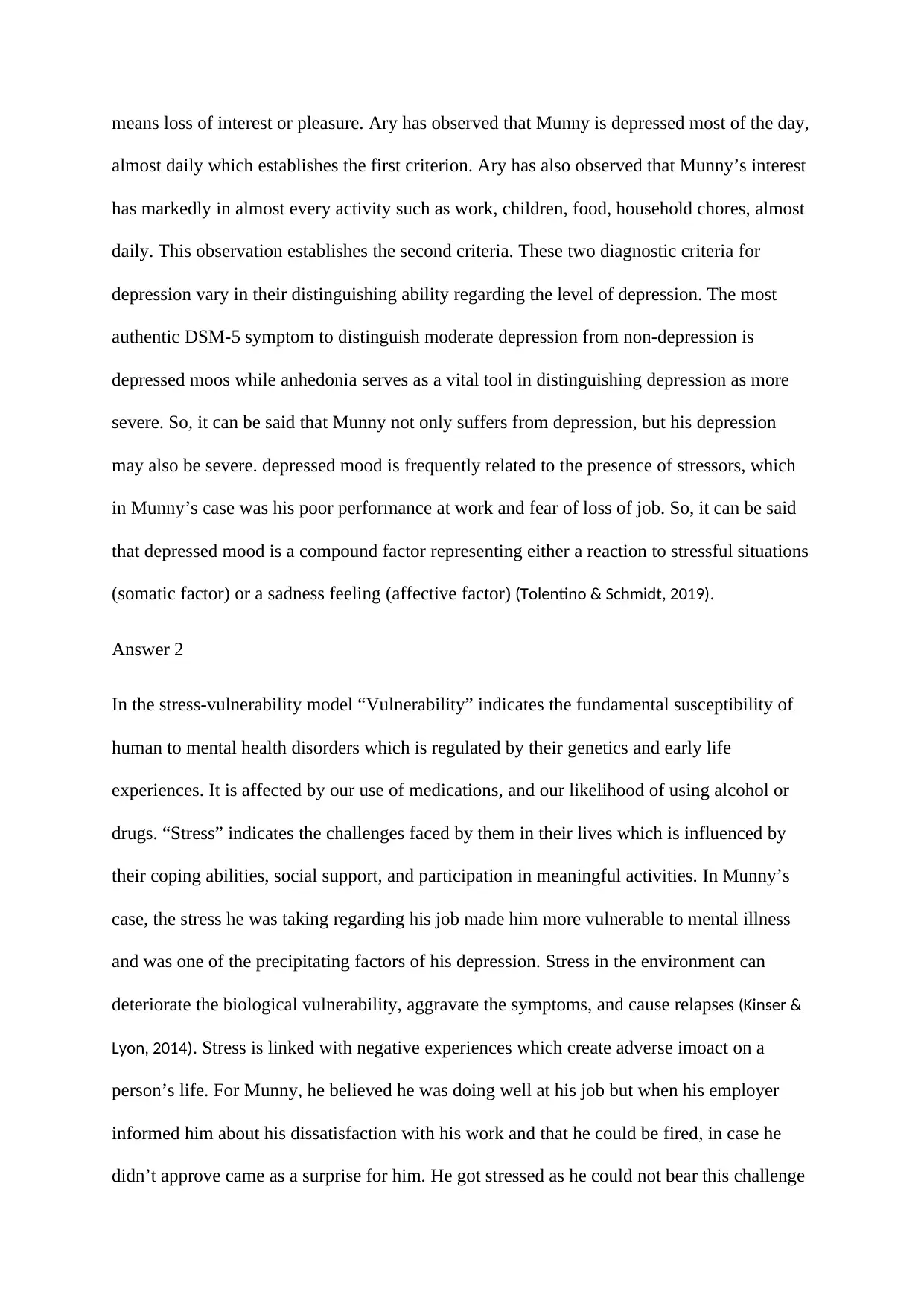
means loss of interest or pleasure. Ary has observed that Munny is depressed most of the day,
almost daily which establishes the first criterion. Ary has also observed that Munny’s interest
has markedly in almost every activity such as work, children, food, household chores, almost
daily. This observation establishes the second criteria. These two diagnostic criteria for
depression vary in their distinguishing ability regarding the level of depression. The most
authentic DSM-5 symptom to distinguish moderate depression from non-depression is
depressed moos while anhedonia serves as a vital tool in distinguishing depression as more
severe. So, it can be said that Munny not only suffers from depression, but his depression
may also be severe. depressed mood is frequently related to the presence of stressors, which
in Munny’s case was his poor performance at work and fear of loss of job. So, it can be said
that depressed mood is a compound factor representing either a reaction to stressful situations
(somatic factor) or a sadness feeling (affective factor) (Tolentino & Schmidt, 2019).
Answer 2
In the stress-vulnerability model “Vulnerability” indicates the fundamental susceptibility of
human to mental health disorders which is regulated by their genetics and early life
experiences. It is affected by our use of medications, and our likelihood of using alcohol or
drugs. “Stress” indicates the challenges faced by them in their lives which is influenced by
their coping abilities, social support, and participation in meaningful activities. In Munny’s
case, the stress he was taking regarding his job made him more vulnerable to mental illness
and was one of the precipitating factors of his depression. Stress in the environment can
deteriorate the biological vulnerability, aggravate the symptoms, and cause relapses (Kinser &
Lyon, 2014). Stress is linked with negative experiences which create adverse imoact on a
person’s life. For Munny, he believed he was doing well at his job but when his employer
informed him about his dissatisfaction with his work and that he could be fired, in case he
didn’t approve came as a surprise for him. He got stressed as he could not bear this challenge
almost daily which establishes the first criterion. Ary has also observed that Munny’s interest
has markedly in almost every activity such as work, children, food, household chores, almost
daily. This observation establishes the second criteria. These two diagnostic criteria for
depression vary in their distinguishing ability regarding the level of depression. The most
authentic DSM-5 symptom to distinguish moderate depression from non-depression is
depressed moos while anhedonia serves as a vital tool in distinguishing depression as more
severe. So, it can be said that Munny not only suffers from depression, but his depression
may also be severe. depressed mood is frequently related to the presence of stressors, which
in Munny’s case was his poor performance at work and fear of loss of job. So, it can be said
that depressed mood is a compound factor representing either a reaction to stressful situations
(somatic factor) or a sadness feeling (affective factor) (Tolentino & Schmidt, 2019).
Answer 2
In the stress-vulnerability model “Vulnerability” indicates the fundamental susceptibility of
human to mental health disorders which is regulated by their genetics and early life
experiences. It is affected by our use of medications, and our likelihood of using alcohol or
drugs. “Stress” indicates the challenges faced by them in their lives which is influenced by
their coping abilities, social support, and participation in meaningful activities. In Munny’s
case, the stress he was taking regarding his job made him more vulnerable to mental illness
and was one of the precipitating factors of his depression. Stress in the environment can
deteriorate the biological vulnerability, aggravate the symptoms, and cause relapses (Kinser &
Lyon, 2014). Stress is linked with negative experiences which create adverse imoact on a
person’s life. For Munny, he believed he was doing well at his job but when his employer
informed him about his dissatisfaction with his work and that he could be fired, in case he
didn’t approve came as a surprise for him. He got stressed as he could not bear this challenge
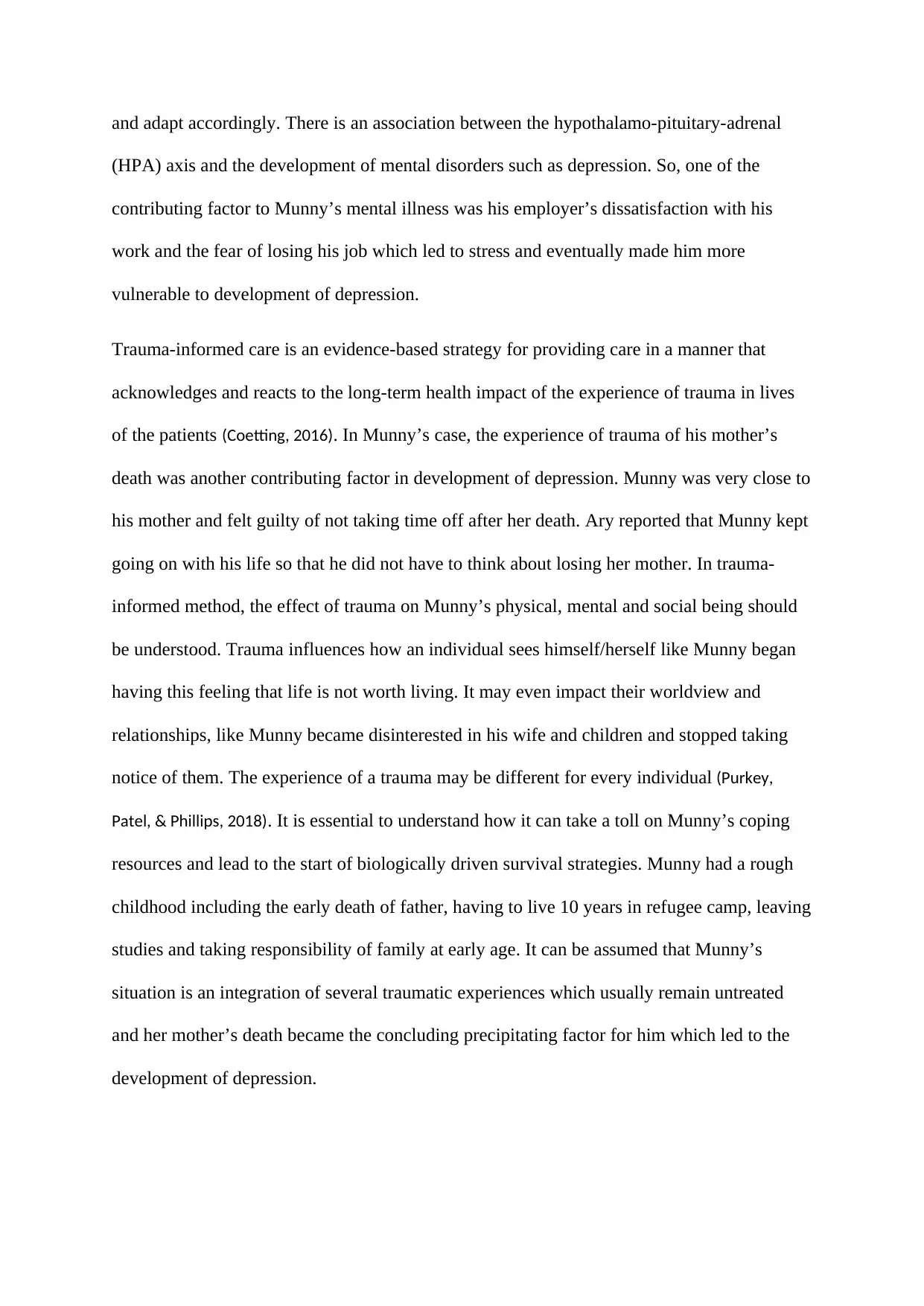
and adapt accordingly. There is an association between the hypothalamo-pituitary-adrenal
(HPA) axis and the development of mental disorders such as depression. So, one of the
contributing factor to Munny’s mental illness was his employer’s dissatisfaction with his
work and the fear of losing his job which led to stress and eventually made him more
vulnerable to development of depression.
Trauma-informed care is an evidence-based strategy for providing care in a manner that
acknowledges and reacts to the long-term health impact of the experience of trauma in lives
of the patients (Coetting, 2016). In Munny’s case, the experience of trauma of his mother’s
death was another contributing factor in development of depression. Munny was very close to
his mother and felt guilty of not taking time off after her death. Ary reported that Munny kept
going on with his life so that he did not have to think about losing her mother. In trauma-
informed method, the effect of trauma on Munny’s physical, mental and social being should
be understood. Trauma influences how an individual sees himself/herself like Munny began
having this feeling that life is not worth living. It may even impact their worldview and
relationships, like Munny became disinterested in his wife and children and stopped taking
notice of them. The experience of a trauma may be different for every individual (Purkey,
Patel, & Phillips, 2018). It is essential to understand how it can take a toll on Munny’s coping
resources and lead to the start of biologically driven survival strategies. Munny had a rough
childhood including the early death of father, having to live 10 years in refugee camp, leaving
studies and taking responsibility of family at early age. It can be assumed that Munny’s
situation is an integration of several traumatic experiences which usually remain untreated
and her mother’s death became the concluding precipitating factor for him which led to the
development of depression.
(HPA) axis and the development of mental disorders such as depression. So, one of the
contributing factor to Munny’s mental illness was his employer’s dissatisfaction with his
work and the fear of losing his job which led to stress and eventually made him more
vulnerable to development of depression.
Trauma-informed care is an evidence-based strategy for providing care in a manner that
acknowledges and reacts to the long-term health impact of the experience of trauma in lives
of the patients (Coetting, 2016). In Munny’s case, the experience of trauma of his mother’s
death was another contributing factor in development of depression. Munny was very close to
his mother and felt guilty of not taking time off after her death. Ary reported that Munny kept
going on with his life so that he did not have to think about losing her mother. In trauma-
informed method, the effect of trauma on Munny’s physical, mental and social being should
be understood. Trauma influences how an individual sees himself/herself like Munny began
having this feeling that life is not worth living. It may even impact their worldview and
relationships, like Munny became disinterested in his wife and children and stopped taking
notice of them. The experience of a trauma may be different for every individual (Purkey,
Patel, & Phillips, 2018). It is essential to understand how it can take a toll on Munny’s coping
resources and lead to the start of biologically driven survival strategies. Munny had a rough
childhood including the early death of father, having to live 10 years in refugee camp, leaving
studies and taking responsibility of family at early age. It can be assumed that Munny’s
situation is an integration of several traumatic experiences which usually remain untreated
and her mother’s death became the concluding precipitating factor for him which led to the
development of depression.
⊘ This is a preview!⊘
Do you want full access?
Subscribe today to unlock all pages.

Trusted by 1+ million students worldwide
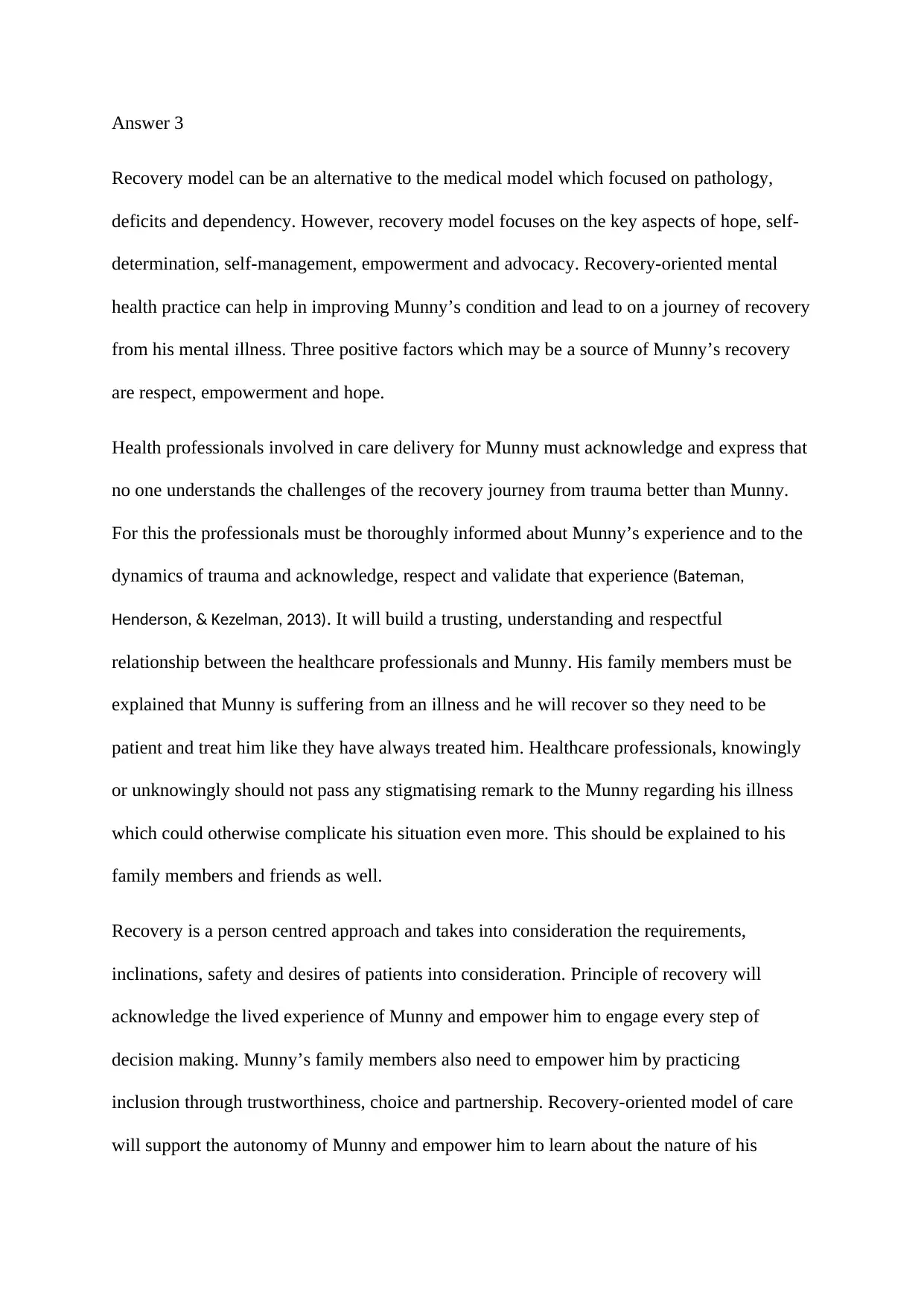
Answer 3
Recovery model can be an alternative to the medical model which focused on pathology,
deficits and dependency. However, recovery model focuses on the key aspects of hope, self-
determination, self-management, empowerment and advocacy. Recovery-oriented mental
health practice can help in improving Munny’s condition and lead to on a journey of recovery
from his mental illness. Three positive factors which may be a source of Munny’s recovery
are respect, empowerment and hope.
Health professionals involved in care delivery for Munny must acknowledge and express that
no one understands the challenges of the recovery journey from trauma better than Munny.
For this the professionals must be thoroughly informed about Munny’s experience and to the
dynamics of trauma and acknowledge, respect and validate that experience (Bateman,
Henderson, & Kezelman, 2013). It will build a trusting, understanding and respectful
relationship between the healthcare professionals and Munny. His family members must be
explained that Munny is suffering from an illness and he will recover so they need to be
patient and treat him like they have always treated him. Healthcare professionals, knowingly
or unknowingly should not pass any stigmatising remark to the Munny regarding his illness
which could otherwise complicate his situation even more. This should be explained to his
family members and friends as well.
Recovery is a person centred approach and takes into consideration the requirements,
inclinations, safety and desires of patients into consideration. Principle of recovery will
acknowledge the lived experience of Munny and empower him to engage every step of
decision making. Munny’s family members also need to empower him by practicing
inclusion through trustworthiness, choice and partnership. Recovery-oriented model of care
will support the autonomy of Munny and empower him to learn about the nature of his
Recovery model can be an alternative to the medical model which focused on pathology,
deficits and dependency. However, recovery model focuses on the key aspects of hope, self-
determination, self-management, empowerment and advocacy. Recovery-oriented mental
health practice can help in improving Munny’s condition and lead to on a journey of recovery
from his mental illness. Three positive factors which may be a source of Munny’s recovery
are respect, empowerment and hope.
Health professionals involved in care delivery for Munny must acknowledge and express that
no one understands the challenges of the recovery journey from trauma better than Munny.
For this the professionals must be thoroughly informed about Munny’s experience and to the
dynamics of trauma and acknowledge, respect and validate that experience (Bateman,
Henderson, & Kezelman, 2013). It will build a trusting, understanding and respectful
relationship between the healthcare professionals and Munny. His family members must be
explained that Munny is suffering from an illness and he will recover so they need to be
patient and treat him like they have always treated him. Healthcare professionals, knowingly
or unknowingly should not pass any stigmatising remark to the Munny regarding his illness
which could otherwise complicate his situation even more. This should be explained to his
family members and friends as well.
Recovery is a person centred approach and takes into consideration the requirements,
inclinations, safety and desires of patients into consideration. Principle of recovery will
acknowledge the lived experience of Munny and empower him to engage every step of
decision making. Munny’s family members also need to empower him by practicing
inclusion through trustworthiness, choice and partnership. Recovery-oriented model of care
will support the autonomy of Munny and empower him to learn about the nature of his
Paraphrase This Document
Need a fresh take? Get an instant paraphrase of this document with our AI Paraphraser
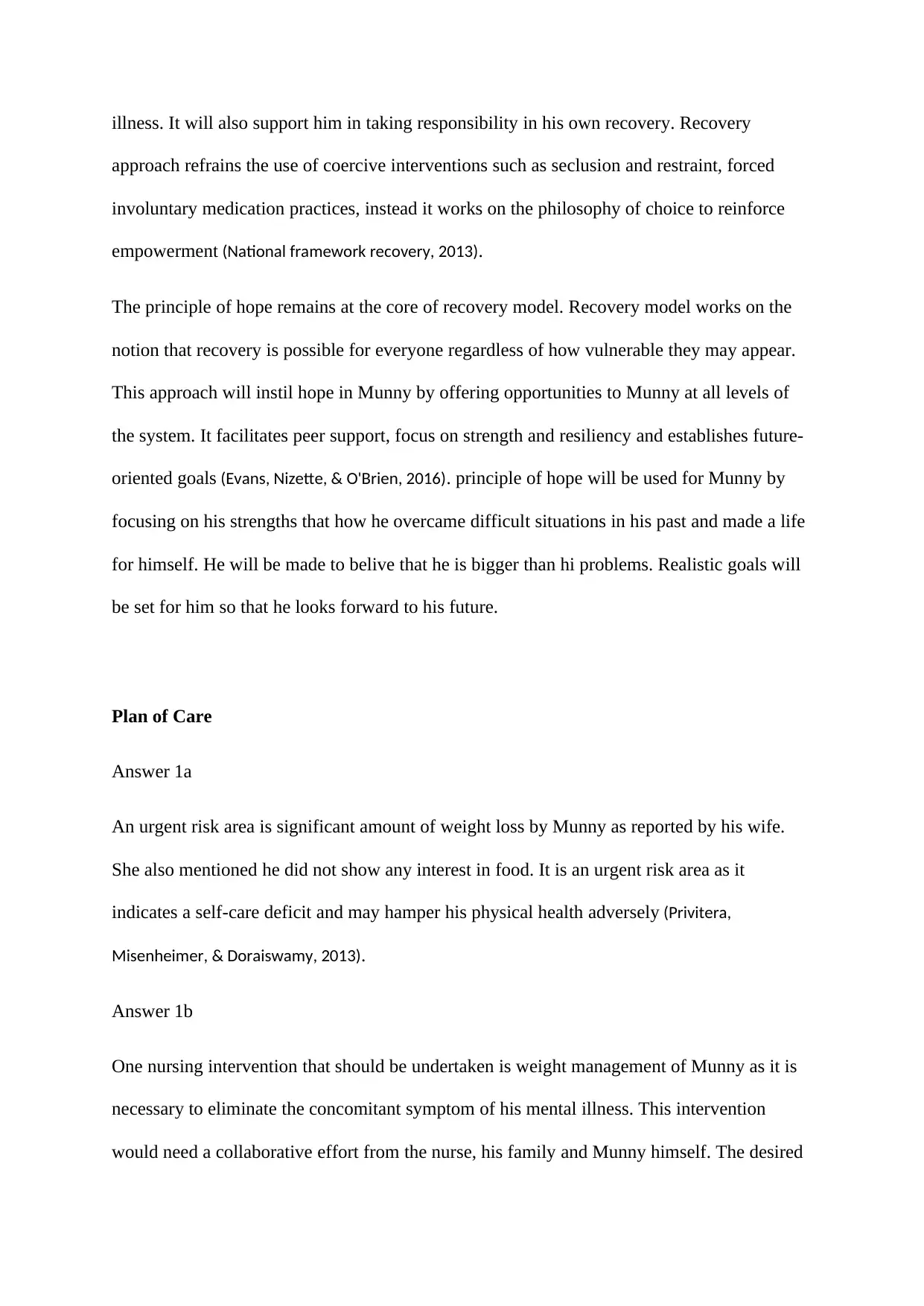
illness. It will also support him in taking responsibility in his own recovery. Recovery
approach refrains the use of coercive interventions such as seclusion and restraint, forced
involuntary medication practices, instead it works on the philosophy of choice to reinforce
empowerment (National framework recovery, 2013).
The principle of hope remains at the core of recovery model. Recovery model works on the
notion that recovery is possible for everyone regardless of how vulnerable they may appear.
This approach will instil hope in Munny by offering opportunities to Munny at all levels of
the system. It facilitates peer support, focus on strength and resiliency and establishes future-
oriented goals (Evans, Nizette, & O'Brien, 2016). principle of hope will be used for Munny by
focusing on his strengths that how he overcame difficult situations in his past and made a life
for himself. He will be made to belive that he is bigger than hi problems. Realistic goals will
be set for him so that he looks forward to his future.
Plan of Care
Answer 1a
An urgent risk area is significant amount of weight loss by Munny as reported by his wife.
She also mentioned he did not show any interest in food. It is an urgent risk area as it
indicates a self-care deficit and may hamper his physical health adversely (Privitera,
Misenheimer, & Doraiswamy, 2013).
Answer 1b
One nursing intervention that should be undertaken is weight management of Munny as it is
necessary to eliminate the concomitant symptom of his mental illness. This intervention
would need a collaborative effort from the nurse, his family and Munny himself. The desired
approach refrains the use of coercive interventions such as seclusion and restraint, forced
involuntary medication practices, instead it works on the philosophy of choice to reinforce
empowerment (National framework recovery, 2013).
The principle of hope remains at the core of recovery model. Recovery model works on the
notion that recovery is possible for everyone regardless of how vulnerable they may appear.
This approach will instil hope in Munny by offering opportunities to Munny at all levels of
the system. It facilitates peer support, focus on strength and resiliency and establishes future-
oriented goals (Evans, Nizette, & O'Brien, 2016). principle of hope will be used for Munny by
focusing on his strengths that how he overcame difficult situations in his past and made a life
for himself. He will be made to belive that he is bigger than hi problems. Realistic goals will
be set for him so that he looks forward to his future.
Plan of Care
Answer 1a
An urgent risk area is significant amount of weight loss by Munny as reported by his wife.
She also mentioned he did not show any interest in food. It is an urgent risk area as it
indicates a self-care deficit and may hamper his physical health adversely (Privitera,
Misenheimer, & Doraiswamy, 2013).
Answer 1b
One nursing intervention that should be undertaken is weight management of Munny as it is
necessary to eliminate the concomitant symptom of his mental illness. This intervention
would need a collaborative effort from the nurse, his family and Munny himself. The desired
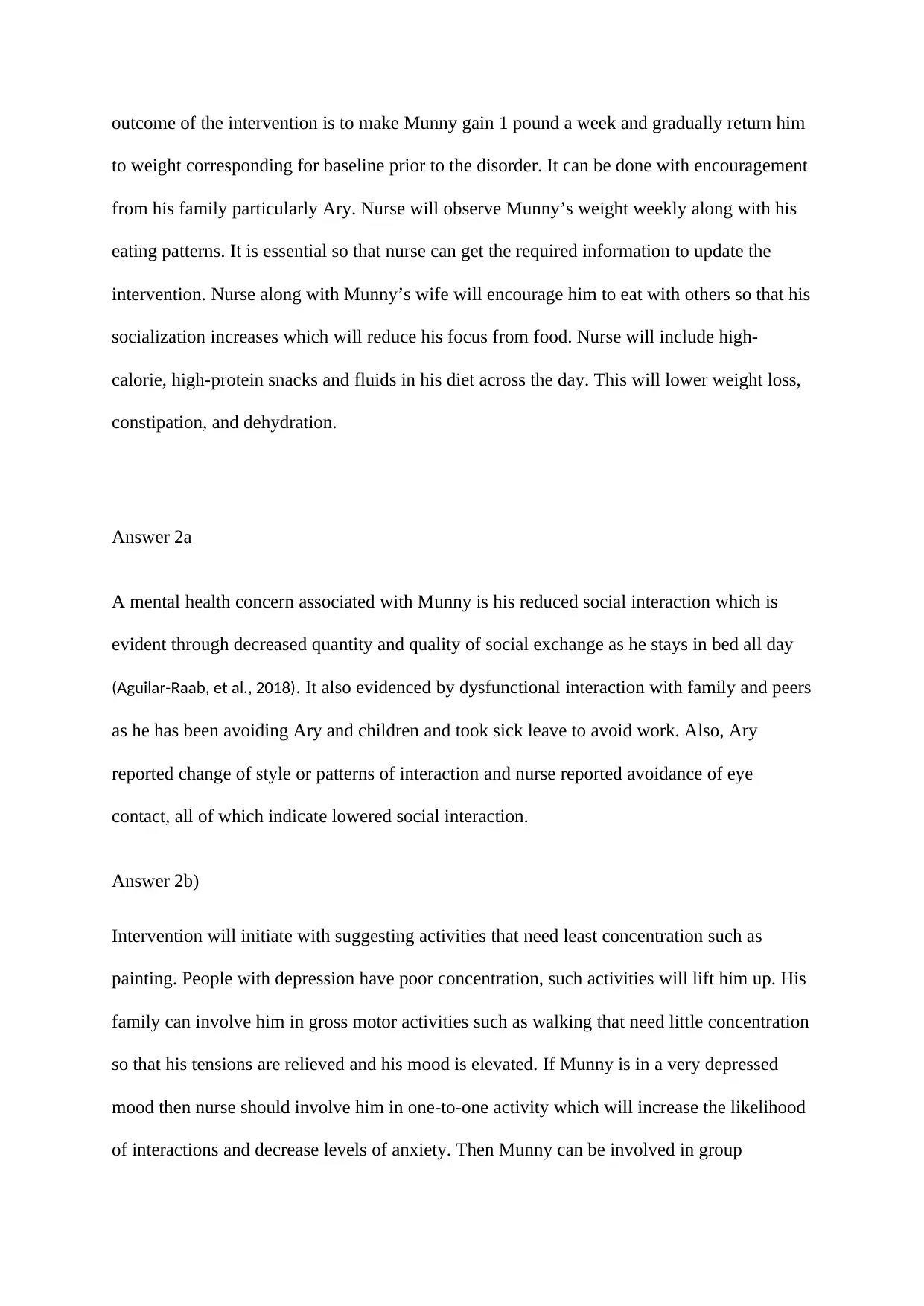
outcome of the intervention is to make Munny gain 1 pound a week and gradually return him
to weight corresponding for baseline prior to the disorder. It can be done with encouragement
from his family particularly Ary. Nurse will observe Munny’s weight weekly along with his
eating patterns. It is essential so that nurse can get the required information to update the
intervention. Nurse along with Munny’s wife will encourage him to eat with others so that his
socialization increases which will reduce his focus from food. Nurse will include high-
calorie, high-protein snacks and fluids in his diet across the day. This will lower weight loss,
constipation, and dehydration.
Answer 2a
A mental health concern associated with Munny is his reduced social interaction which is
evident through decreased quantity and quality of social exchange as he stays in bed all day
(Aguilar-Raab, et al., 2018). It also evidenced by dysfunctional interaction with family and peers
as he has been avoiding Ary and children and took sick leave to avoid work. Also, Ary
reported change of style or patterns of interaction and nurse reported avoidance of eye
contact, all of which indicate lowered social interaction.
Answer 2b)
Intervention will initiate with suggesting activities that need least concentration such as
painting. People with depression have poor concentration, such activities will lift him up. His
family can involve him in gross motor activities such as walking that need little concentration
so that his tensions are relieved and his mood is elevated. If Munny is in a very depressed
mood then nurse should involve him in one-to-one activity which will increase the likelihood
of interactions and decrease levels of anxiety. Then Munny can be involved in group
to weight corresponding for baseline prior to the disorder. It can be done with encouragement
from his family particularly Ary. Nurse will observe Munny’s weight weekly along with his
eating patterns. It is essential so that nurse can get the required information to update the
intervention. Nurse along with Munny’s wife will encourage him to eat with others so that his
socialization increases which will reduce his focus from food. Nurse will include high-
calorie, high-protein snacks and fluids in his diet across the day. This will lower weight loss,
constipation, and dehydration.
Answer 2a
A mental health concern associated with Munny is his reduced social interaction which is
evident through decreased quantity and quality of social exchange as he stays in bed all day
(Aguilar-Raab, et al., 2018). It also evidenced by dysfunctional interaction with family and peers
as he has been avoiding Ary and children and took sick leave to avoid work. Also, Ary
reported change of style or patterns of interaction and nurse reported avoidance of eye
contact, all of which indicate lowered social interaction.
Answer 2b)
Intervention will initiate with suggesting activities that need least concentration such as
painting. People with depression have poor concentration, such activities will lift him up. His
family can involve him in gross motor activities such as walking that need little concentration
so that his tensions are relieved and his mood is elevated. If Munny is in a very depressed
mood then nurse should involve him in one-to-one activity which will increase the likelihood
of interactions and decrease levels of anxiety. Then Munny can be involved in group
⊘ This is a preview!⊘
Do you want full access?
Subscribe today to unlock all pages.

Trusted by 1+ million students worldwide
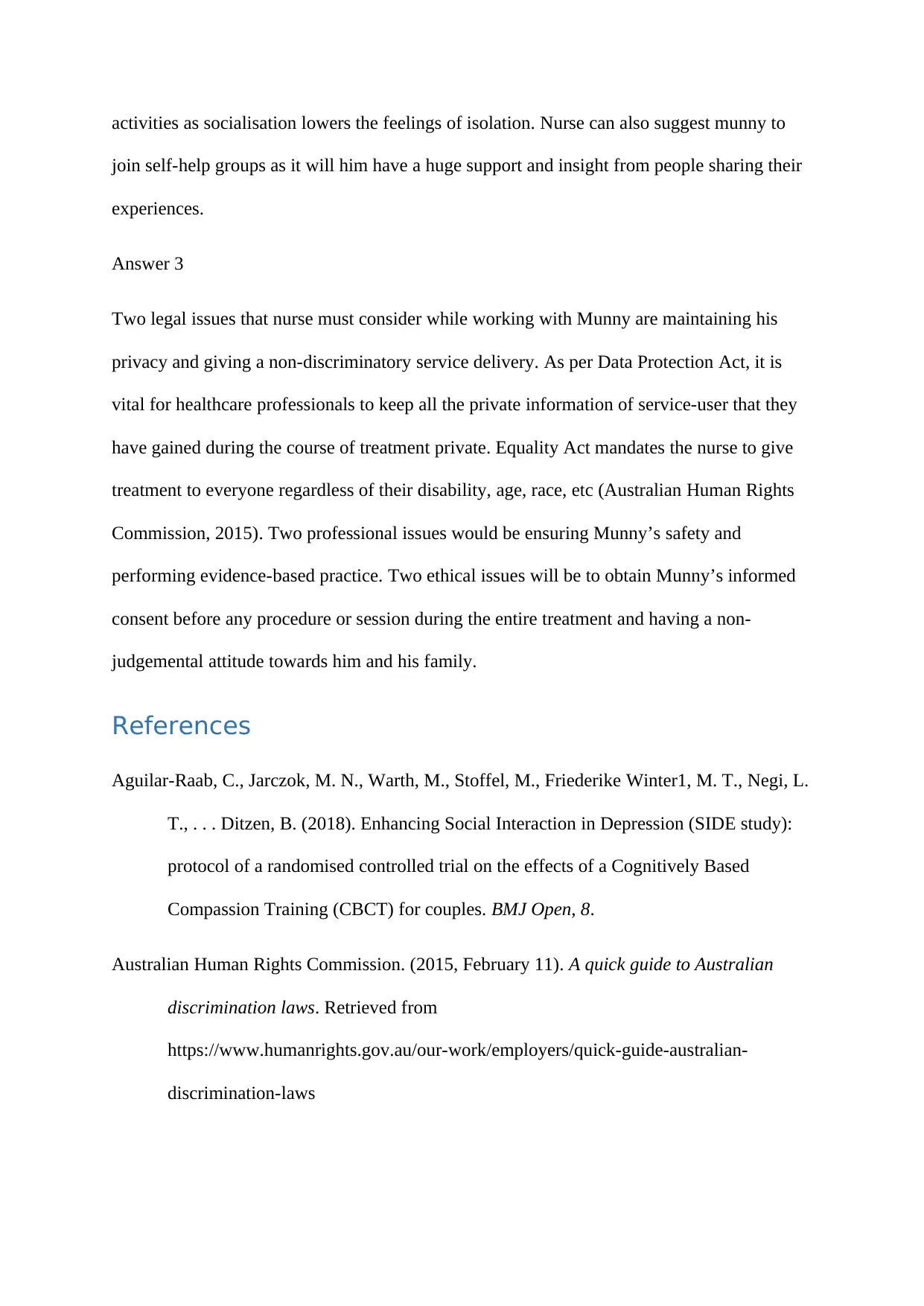
activities as socialisation lowers the feelings of isolation. Nurse can also suggest munny to
join self-help groups as it will him have a huge support and insight from people sharing their
experiences.
Answer 3
Two legal issues that nurse must consider while working with Munny are maintaining his
privacy and giving a non-discriminatory service delivery. As per Data Protection Act, it is
vital for healthcare professionals to keep all the private information of service-user that they
have gained during the course of treatment private. Equality Act mandates the nurse to give
treatment to everyone regardless of their disability, age, race, etc (Australian Human Rights
Commission, 2015). Two professional issues would be ensuring Munny’s safety and
performing evidence-based practice. Two ethical issues will be to obtain Munny’s informed
consent before any procedure or session during the entire treatment and having a non-
judgemental attitude towards him and his family.
References
Aguilar-Raab, C., Jarczok, M. N., Warth, M., Stoffel, M., Friederike Winter1, M. T., Negi, L.
T., . . . Ditzen, B. (2018). Enhancing Social Interaction in Depression (SIDE study):
protocol of a randomised controlled trial on the effects of a Cognitively Based
Compassion Training (CBCT) for couples. BMJ Open, 8.
Australian Human Rights Commission. (2015, February 11). A quick guide to Australian
discrimination laws. Retrieved from
https://www.humanrights.gov.au/our-work/employers/quick-guide-australian-
discrimination-laws
join self-help groups as it will him have a huge support and insight from people sharing their
experiences.
Answer 3
Two legal issues that nurse must consider while working with Munny are maintaining his
privacy and giving a non-discriminatory service delivery. As per Data Protection Act, it is
vital for healthcare professionals to keep all the private information of service-user that they
have gained during the course of treatment private. Equality Act mandates the nurse to give
treatment to everyone regardless of their disability, age, race, etc (Australian Human Rights
Commission, 2015). Two professional issues would be ensuring Munny’s safety and
performing evidence-based practice. Two ethical issues will be to obtain Munny’s informed
consent before any procedure or session during the entire treatment and having a non-
judgemental attitude towards him and his family.
References
Aguilar-Raab, C., Jarczok, M. N., Warth, M., Stoffel, M., Friederike Winter1, M. T., Negi, L.
T., . . . Ditzen, B. (2018). Enhancing Social Interaction in Depression (SIDE study):
protocol of a randomised controlled trial on the effects of a Cognitively Based
Compassion Training (CBCT) for couples. BMJ Open, 8.
Australian Human Rights Commission. (2015, February 11). A quick guide to Australian
discrimination laws. Retrieved from
https://www.humanrights.gov.au/our-work/employers/quick-guide-australian-
discrimination-laws
Paraphrase This Document
Need a fresh take? Get an instant paraphrase of this document with our AI Paraphraser
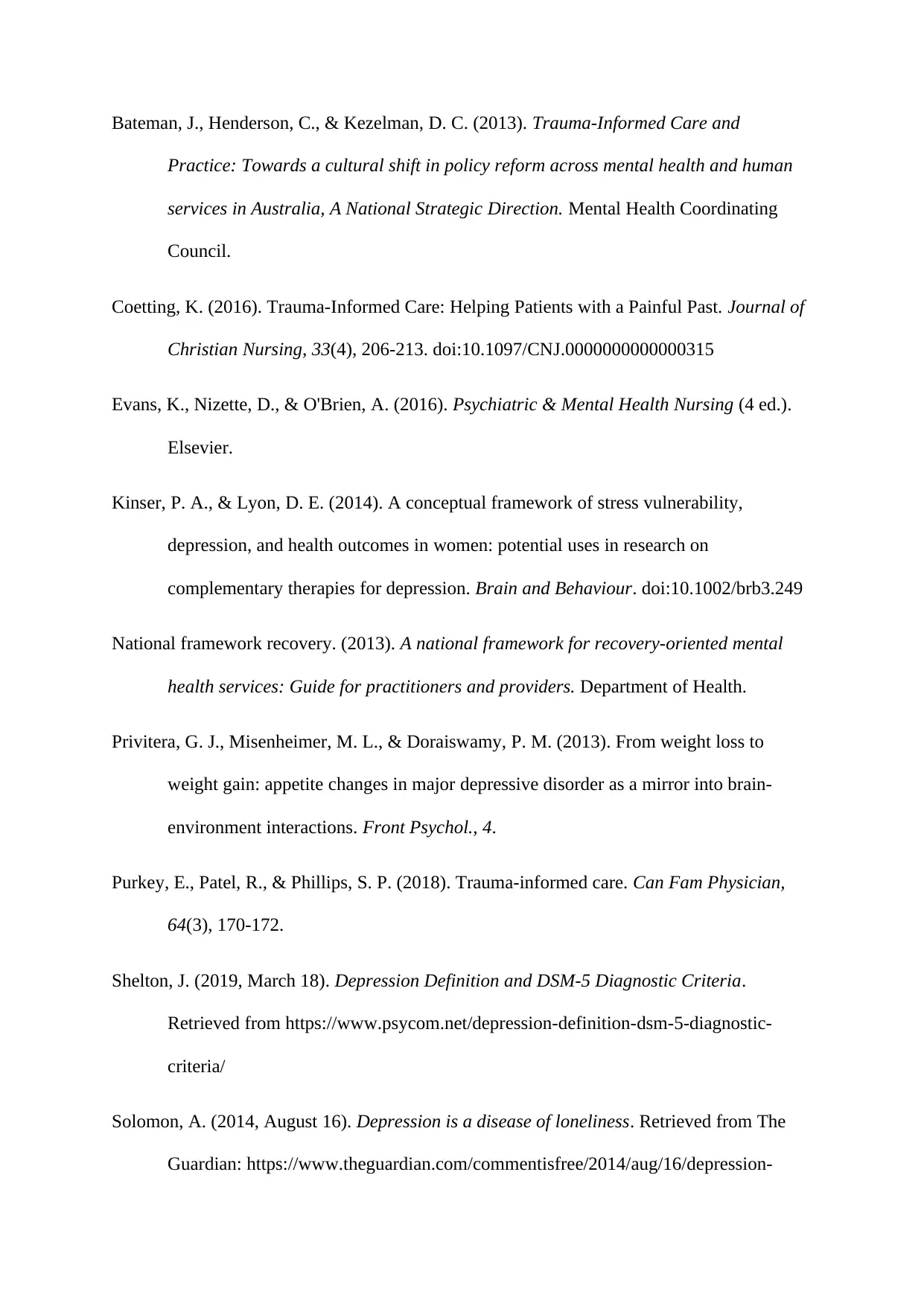
Bateman, J., Henderson, C., & Kezelman, D. C. (2013). Trauma-Informed Care and
Practice: Towards a cultural shift in policy reform across mental health and human
services in Australia, A National Strategic Direction. Mental Health Coordinating
Council.
Coetting, K. (2016). Trauma-Informed Care: Helping Patients with a Painful Past. Journal of
Christian Nursing, 33(4), 206-213. doi:10.1097/CNJ.0000000000000315
Evans, K., Nizette, D., & O'Brien, A. (2016). Psychiatric & Mental Health Nursing (4 ed.).
Elsevier.
Kinser, P. A., & Lyon, D. E. (2014). A conceptual framework of stress vulnerability,
depression, and health outcomes in women: potential uses in research on
complementary therapies for depression. Brain and Behaviour. doi:10.1002/brb3.249
National framework recovery. (2013). A national framework for recovery-oriented mental
health services: Guide for practitioners and providers. Department of Health.
Privitera, G. J., Misenheimer, M. L., & Doraiswamy, P. M. (2013). From weight loss to
weight gain: appetite changes in major depressive disorder as a mirror into brain-
environment interactions. Front Psychol., 4.
Purkey, E., Patel, R., & Phillips, S. P. (2018). Trauma-informed care. Can Fam Physician,
64(3), 170-172.
Shelton, J. (2019, March 18). Depression Definition and DSM-5 Diagnostic Criteria.
Retrieved from https://www.psycom.net/depression-definition-dsm-5-diagnostic-
criteria/
Solomon, A. (2014, August 16). Depression is a disease of loneliness. Retrieved from The
Guardian: https://www.theguardian.com/commentisfree/2014/aug/16/depression-
Practice: Towards a cultural shift in policy reform across mental health and human
services in Australia, A National Strategic Direction. Mental Health Coordinating
Council.
Coetting, K. (2016). Trauma-Informed Care: Helping Patients with a Painful Past. Journal of
Christian Nursing, 33(4), 206-213. doi:10.1097/CNJ.0000000000000315
Evans, K., Nizette, D., & O'Brien, A. (2016). Psychiatric & Mental Health Nursing (4 ed.).
Elsevier.
Kinser, P. A., & Lyon, D. E. (2014). A conceptual framework of stress vulnerability,
depression, and health outcomes in women: potential uses in research on
complementary therapies for depression. Brain and Behaviour. doi:10.1002/brb3.249
National framework recovery. (2013). A national framework for recovery-oriented mental
health services: Guide for practitioners and providers. Department of Health.
Privitera, G. J., Misenheimer, M. L., & Doraiswamy, P. M. (2013). From weight loss to
weight gain: appetite changes in major depressive disorder as a mirror into brain-
environment interactions. Front Psychol., 4.
Purkey, E., Patel, R., & Phillips, S. P. (2018). Trauma-informed care. Can Fam Physician,
64(3), 170-172.
Shelton, J. (2019, March 18). Depression Definition and DSM-5 Diagnostic Criteria.
Retrieved from https://www.psycom.net/depression-definition-dsm-5-diagnostic-
criteria/
Solomon, A. (2014, August 16). Depression is a disease of loneliness. Retrieved from The
Guardian: https://www.theguardian.com/commentisfree/2014/aug/16/depression-
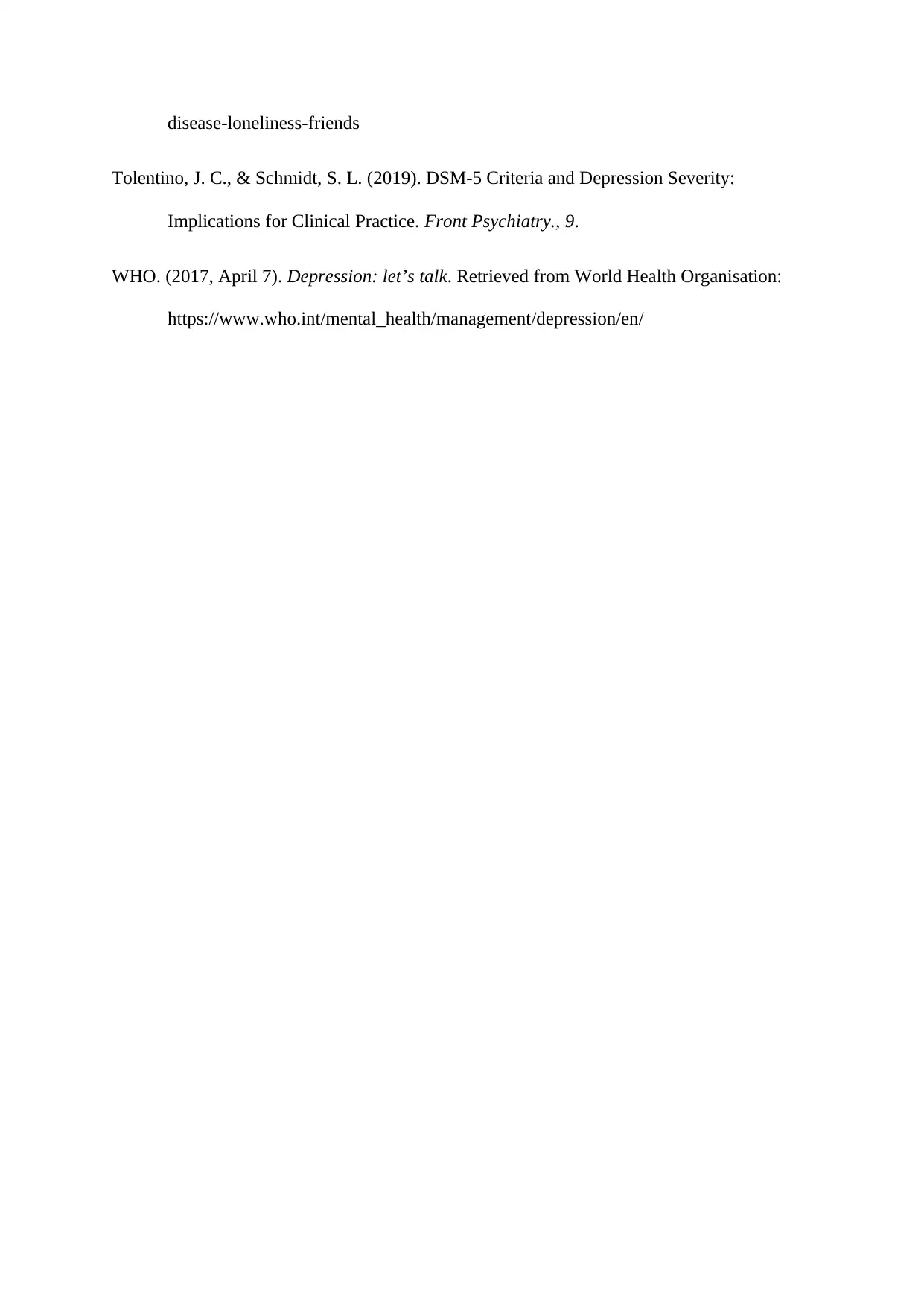
disease-loneliness-friends
Tolentino, J. C., & Schmidt, S. L. (2019). DSM-5 Criteria and Depression Severity:
Implications for Clinical Practice. Front Psychiatry., 9.
WHO. (2017, April 7). Depression: let’s talk. Retrieved from World Health Organisation:
https://www.who.int/mental_health/management/depression/en/
Tolentino, J. C., & Schmidt, S. L. (2019). DSM-5 Criteria and Depression Severity:
Implications for Clinical Practice. Front Psychiatry., 9.
WHO. (2017, April 7). Depression: let’s talk. Retrieved from World Health Organisation:
https://www.who.int/mental_health/management/depression/en/
⊘ This is a preview!⊘
Do you want full access?
Subscribe today to unlock all pages.

Trusted by 1+ million students worldwide
1 out of 9
Related Documents
Your All-in-One AI-Powered Toolkit for Academic Success.
+13062052269
info@desklib.com
Available 24*7 on WhatsApp / Email
![[object Object]](/_next/static/media/star-bottom.7253800d.svg)
Unlock your academic potential
Copyright © 2020–2026 A2Z Services. All Rights Reserved. Developed and managed by ZUCOL.





